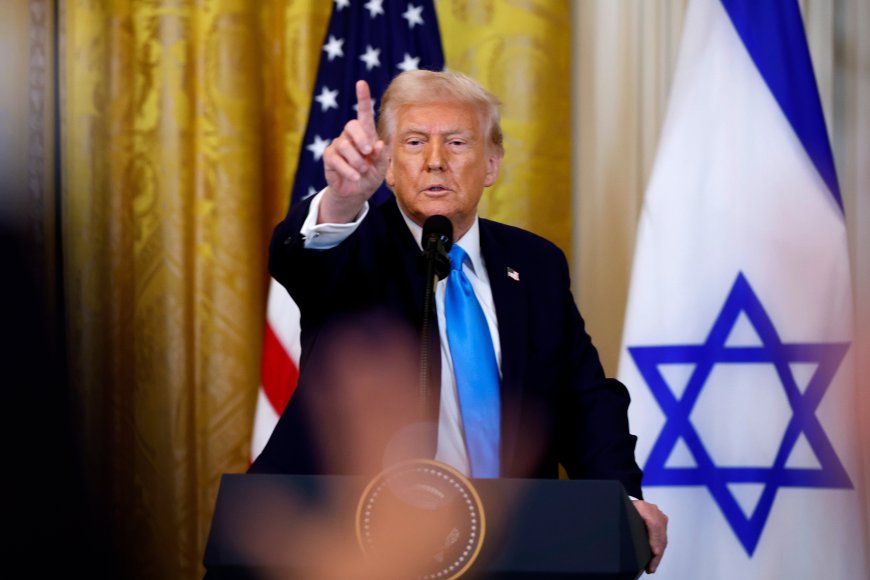Trump's Vision for Gaza: A Comprehensive Strategy or a Misguided Fantasy?
Donald Trump is well-acquainted with contentious proposals; however, his most recent suggestion regarding Gaza has elicited significant scrutiny from various political factions. In a joint statement with Israeli Prime Minister Benjamin Netanyahu, former President Trump asserted that the United States would "assume control of the Gaza Strip," "reconstruct it," and convert it into a thriving economic center, referred to as the "Riviera of the Middle East." His strategy entails the temporary relocation of Gazans and may involve the deployment of U.S. military personnel to supervise the reconstruction efforts.

Donald Trump is well-acquainted with contentious proposals; however, his most recent suggestion regarding Gaza has elicited significant scrutiny from various political factions. In a joint statement with Israeli Prime Minister Benjamin Netanyahu, former President Trump asserted that the United States would "assume control of the Gaza Strip," "reconstruct it," and convert it into a thriving economic center, referred to as the "Riviera of the Middle East." His strategy entails the temporary relocation of Gazans and may involve the deployment of U.S. military personnel to supervise the reconstruction efforts.
Upon initial examination, the proposal may appear to be ambitious, if not overly optimistic. However, the actual situation is considerably more complex. The concept of a Gaza redevelopment initiative spearheaded by the United States is inherently impractical, having been dismissed by virtually all relevant stakeholders, including the American populace, Middle Eastern countries, and Israel itself. Trump's statement underscores a more pervasive issue: the persistent inadequacies of international policies concerning Gaza.
Trump's proposal encounters prompt opposition domestically. The United States has only recently disengaged from two protracted and financially burdensome military engagements in the Middle East, and the prospect of deploying soldiers to another conflict zone is improbable to garner public endorsement. Even Republican Senator Lindsey Graham, recognized as one of Washington's most ardent proponents of military intervention, rejected the notion, asserting, "I believe that the majority of South Carolinians would likely not be enthusiastic about deploying American forces to assume control of Gaza."
Regional stakeholders exhibit an equivalent level of opposition. Former President Trump proposed that Egypt and Jordan might temporarily accommodate displaced individuals from Gaza; however, both countries have historically opposed the resettlement of significant numbers of Palestinian refugees. Notwithstanding their public endorsement of the Palestinian cause, neither administration desires the political and social turmoil that would accompany a substantial influx of refugees.
The proposal also contradicts a fundamental tenet of Israeli security doctrine: self-reliance. Israel, a nation established on the principle of Jewish self-determination, has consistently maintained its stance on self-defense without the involvement of external entities. Although Israel is significantly dependent on American military assistance, it has consistently engaged in its own military confrontations. The potential deployment of U.S. personnel in Gaza may jeopardize this doctrine and generate a new array of liabilities for both nations.
A Genuine Issue, An Imperfect Resolution
Although Trump's proposal may be deemed impractical, it underscores an undeniable reality: the existing conditions in Gaza are untenable. For many years, international assistance has been directed into the region, only to be misappropriated by Hamas, which reallocates resources to further its conflict with Israel. In response, Israeli administrations—propelled further to the right by recurrent Hamas rocket assaults—have intensified their control over Gaza. What is the outcome? A continuous cycle of devastation, restoration, and subsequent hostilities.
Trump's spontaneous comments indicate a recognition that the present condition of Gaza is unsustainable. "The situation in Gaza has proven ineffective; it has consistently failed to yield positive results," he remarked, characterizing the region as a "complete demolition site." His proposal to resettle Gazans in alternative locations—though highly contentious—arises from the conviction that returning to a war-torn Gaza presents no viable future. Nevertheless, forcible displacement would constitute an act of ethnic cleansing, a situation that would be universally denounced.
A more viable strategy would entail the temporary relocation of individuals under dignified circumstances while Gaza undergoes reconstruction, subject to stringent international supervision. The objective would be to displace Hamas from authority, guarantee the appropriate distribution of humanitarian assistance, and develop a comprehensive governance strategy that emphasizes stability rather than armed conflict. This, however, would necessitate comprehensive coordination among the United States, Israel, Arab nations, and international organizations—an aspect that is absent in Trump's unilateral approach.
Trump's announcement generates a greater number of inquiries than it resolves. Will he guarantee that the existing armistice between Israel and Hamas remains intact throughout its anticipated second phase in March? Will his administration implement measures against Iran, the principal sponsor of Hamas, should diplomatic efforts prove unsuccessful? Moreover, it is noteworthy that Trump alluded to a forthcoming policy alteration regarding the Israeli annexation of the West Bank, a development that may further complicate efforts toward achieving peace.
It remains to be determined whether Trump's proposal regarding Gaza was a strategic negotiating tactic, a diversionary measure, or a sincere policy initiative. What is unequivocal, however, is that the Middle East is entering a novel and unpredictable epoch—one in which traditional assumptions are rendered obsolete and where even the most unconventional ideas, for better or for worse, now influence the discourse.













































